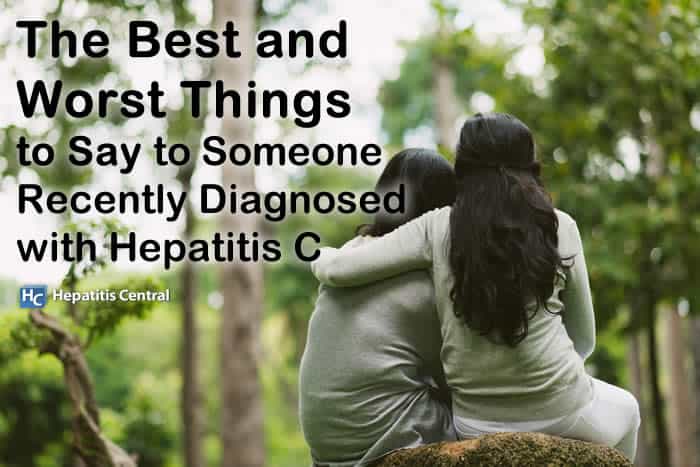The Best and Worst Things to Say to Someone Recently Diagnosed with Hepatitis C


On April 10, 2020, the Centers for Disease Control and Prevention (CDC) issued a new recommendation that all adults be screened for hepatitis C, with people at higher risk being tested more often, and that pregnant women get screened with every pregnancy. (1)
The goal of more universal testing, according to the CDC, is to help people identify whether they have this disease characterized by liver inflammation, especially since an estimated 44% don’t know they have it.
This means that more people are likely to be diagnosed with hep C in the near future. What if one of those people is your family member or friend? Should this occur, it is helpful to know what to say to them, as well as what not to say.
The Best Things to Say to Someone Just Diagnosed with Hepatitis C
The right response upon learning that a loved one has been diagnosed with hepatitis C can mean the difference between them feeling loved and supported, or them feeling ashamed, scared, or somehow accused of doing something wrong.
Here are a few things to say that fall on the loved and supported side of the fence:
- “I’m here if you’d like to talk.” Letting them know that you’re all ears if they want to talk, scream, vent, or otherwise put their diagnosis into words can give them some relief. Not everyone wants to talk about this type of diagnosis, so it lets them know that it’s okay for them to talk to you. This type of response also keeps the door open if they aren’t ready to talk about it now but may want to in the future.
- “What can I do to help?” This simple question shows your concern without asking for private information or jumping in to help when that’s not what they want or need. It also tells them that you are there for them should they need a ride to treatment or even someone to go with them when talking to their doctor. All they have to do is tell you what they need and you will get it done.
- “I’ve heard that hepatitis C is highly treatable.” The benefit of this response is that helps inspire hope in the person. It also informs them that there are effective treatment options while encouraging them to check into them. For instance, once-daily oral treatments have been found to help 9 in 10 people with hepatitis C achieve a sustained virological response rate, and they tend to be well tolerated. (2)
- “Is there anything I can help you find out about the virus?” The reason this is helpful is that information is power. The more the person learns about hepatitis C, the more they know what to expect. It helps take the unknown (and fear) out of the equation. Encourage them to learn more about their condition so they know how to best manage it.
The Worst Things to Say When Someone Receives a Hepatitis C Diagnosis

Just as it is important to know what to say, it is equally as critical to be aware of what you could say that might be upsetting to someone who is trying to process their recent hepatitis C diagnosis.
Here are a few things that you should avoid saying to someone with hep C, as well as the reasons why:
- “Really? How did you get it?” You may be genuinely curious, maybe even to educate yourself so you don’t get this virus too. But the problem with asking is that they may not want to share this information, if they even know how they got it. One of the ways that the virus is transmitted is through intravenous drug use. This type of drug use could be part of the person’s past and they may not want you to know about it. Depending on how you ask, this type of question can also be taken as accusatory versus curious in nature.
- “Can your family get it?” Hepatitis C is not spread through casual contact such as holding hands, kissing on the cheek, or sitting side-by-side at the dinner table. It is transmitted by coming in contact with an infected person’s blood. If the person you’re speaking with doesn’t know this, you could panic them into thinking that they are going to be responsible for their family members (and friends) all contracting the virus. The last thing they need is more stress, especially when it is based on false information.
- “Oh my gosh, are you scared?” The reason that you want to avoid this question is that, if they weren’t scared before, they might be now just because you entered this thought into their head. For some, it will imply that they should be scared even though, as mentioned above, the disease is highly treatable.
- “Is the treatment bad?” Asking this question suggests the notion that treatment either may or should have negative side effects. Fortunately, side effects are less common for hepatitis C medications than ever before and the ones that are experienced are generally mild. (3) Therefore, there’s no need to panic the person that they’re somehow facing horrible treatment.
Knowing what to say and not to say can help your loved one feel cared for when first diagnosed with hepatitis C. It also says that you are there for them in whatever way they need.
(1) Centers for Disease Control and Prevention. (2020, April 10). CDC Recommendations for Hepatitis C Screening Among Adults – United States, 2020. Retrieved July 27, 2022, from https://www.cdc.gov/mmwr/volumes/69/rr/rr6902a1.htm
(2) Kish, T., Azia, A., Sorio, M. (2017, May). Hepatitis C in a New Era: A Review of Current Therapies. Pharmacy and Therapeutics. Retrieved July, 27, 2022, from https://www.ncbi.nlm.nih.gov/pmc/articles/PMC5398625/
(3) American Liver Foundation. (2022, April 19). Treating Hepatitis C. Retrieved July 27, 2022, from https://liverfoundation.org/for-patients/about-the-liver/diseases-of-the-liver/hepatitis-c/treating-hepatitis-c/#managing-side-effects-of-treatment







